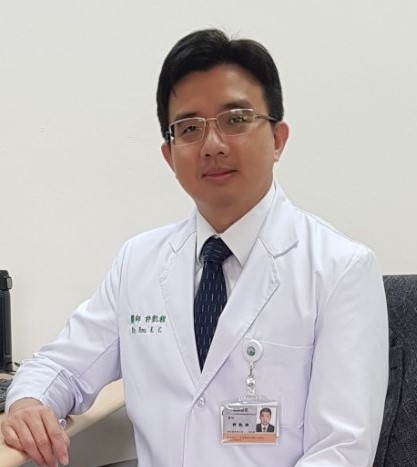SPEAKERS

Kai-Cheng Hsu
AFFILIATION:
China Medical University Hospital, Taichung, Taiwan
POSITION TITLE:
Director of Artificial Intelligence Center (AIC)
EDUCATION/TRAINING:
Ph.D. (Chemical Engineering) National Chung Cheng University, Chiayi, Taiwan 2011 - 2017
Master (Electrical Engineering) National Chung Cheng University, Chiayi, Taiwan 2007 - 2009
M.D. (Medicine) National Taiwan University, Taipei, Taiwan 1993 - 2000
HONORS:
Bronze Medal Award RSNASIIM-FISABIO-RSNA COVID-19 Detection AI, 2021
Silver Medal Award RSNA Pulmonary Embolism Detection AI, 2020
Scholarship award of Ministry of Science and Technology, Taiwan, 2018
Member of Phi Tau Phi Scholastic Honor Society, Taiwan, 2013
Member of Phi Tau Phi Scholastic Honor Society, Taiwan 2009
Scholarship award of National Taiwan University, Taiwan 2000
RESEARCH INTERESTS:
Use Computational Methods to Build Brain Hemodynamic Models of
Cerebrovascular Disorders (MOST 110-2314-B-039 -010 -MY2) 2021
To Establish a Big Medical Data Platform for Stroke in Taiwanese
(MOST 110-2321-B-039 -002 -) 2021
Reducing Stroke Burden via the new biomarker developed by the
integration of China Medical University & Hospital (CMUH) database
and Advanced AI Platforms: from prevention to precision stroke
care (MOST 110-2321-B-039 -003 -) 2021
PUBLICATIONS:
(1) Ho LC, Wang HK, Chiu LT, Wang HH, Lee YC, Hung SY, Sun Y, Wei CY, Hsu KC, Chen YW, Lien LM, Hsu CY. Protein energy wasting–based nutritional assessment
predicts outcomes of acute ischemic stroke and solves the epidemiologic paradox.
Nutrition 2022.
(2) Liu TY, Lin CF, Wu HT, Wu YL, Chen YC, Liao, Chou YP, Chao D, Chang YS, Lu HF, Chang JG, Hsu KC, Tsai FJ, Comparison of multiple imputation algorithms and verificationusing whole-genome sequencing in the CMUH genetic biobank. Biomedicine 2021.
(Corresponding)
(3) Lin CH, Hsu KC, Liang CK, Lee TH, Liou CW, Lee JD, Peng TI, Shih CS. A Disease-Specific Language Representation Model for Cerebrovascular Disease Research. Computer Methods and Programs in Biomedicine 2021.
(4) Wang IK, Yu TM, Yen TH, Chiu LT, Lien LM, Sun y, Wei CY, Hsu KC, Lai PC, Li CY, Sung FC, Hsu CY. Renal dysfunction is associated with lower odds of home discharge for patients with stroke. Postgraduate Medicine 2021.
(5) Yang YW, Hsu KC, Wei CY, Tzeng RC, Chiu PY. Operational Determination of
Subjective Cognitive Decline, Mild Cognitive Impairment, and Dementia Using Sum
of Boxes of the Clinical Dementia Rating Scale. Frontiers in Aging Neuroscience
2021.
(6) Hsu KC, Lin CH, Johnson KR, Fann YC, Hsu CY, Tsai CH, Chen PL, Chang WL, Yeh PY, Wei CY. Comparison of outcome prediction models post-stroke for a population-based registry with clinical variables collected at admission vs. discharge. Vessel Plus. 2021 Jan;5:2.
(7) Lin CH, Hsu KC, Johnson KR, Fann YC, Tsai CH, Sun Y, Lien LM, Chang WL, Chen PL, Lin CL, Hsu CY. Evaluation of machine learning methods to stroke outcome prediction using a nationwide disease registry. Computer Methods and Programs in Biomedicine. 2020 Feb 1;190:105381. doi:10.1016/j.cmpb.2020.105381.
(8) Hsu KC, Lin CH, Johnson KR, Liu CH, Chang TY, Kuo LH, Fann YC, Lee TH. Autodetect extracranial and intracranial artery stenosis by machine learning using ultrasound. Comput Biol Med. 2020 Jan;116:103569. doi:
10.1016/j.compbiomed.2019.103569. Epub 2019 Nov 30.
(9) Lin CH, Hsu KC, Johnson KR, Luby M, Fann YC. Applying density-based outlier
identifications using multiple datasets for validation of stroke clinical outcomes.
International Journal of Medical Informatics. 2019 Oct 3;132:103988. doi:
10.1016/j.ijmedinf.2019.103988
(10) Hsu KC, Wang FS. Detection of minimum biomarker features via bi-level
optimization framework by nested hybrid differential evolution. Journal of the
Taiwan Institute of Chemical Engineers. 2017 Dec; 81: 31-9.
https://doi.org/10.1016/j.jtice.2017.10.015
(11) Hsu KC, Wang FS. Model-based optimization approaches for precision medicine: A case study in presynaptic dopamine overactivity. PLOS ONE. 2017 Jun 14; 12(6): e0179575. https://doi.org/10.1371/journal.pone.0179575
(12) Hsu KC, Wang FS. Fuzzy decision making approach to identify optimum enzyme targets and drug dosage for remedying presynaptic dopamine deficiency. PLOS ONE. 2016 Oct 13;11(10):e0164589. doi: 10.1371/journal.pone.0164589.
(13) Wang FS, Wu WH, Hsu KC. Fuzzy optimization in metabolic systems. International Journal of Biological, Food, Veterinary and Agricultural Engineering. 2014 Jun; 8(7): 661-5.
(14) Hsu KC, Wang FS. Fuzzy optimization for detecting enzyme targets of human uric acid metabolism. Bioinformatics. 2013 Dec;29(24): 3191-8.
(15) Hsu KC, Yu SN. Detection of seizures in EEG using subband nonlinear parameter and genetic algorithm. Comput Biol Med. 2010 Oct;40(10):823-30. Epub 2010 Sep 15.
(16) Lee JD, Ryu SJ, Chang YJ, Hsu KC, Chen YC, Huang YC, Lee M, Hsiao MC, Lee TH. Carotid ultrasound criteria for detecting intracranial carotid stenosis. Eur Neurol. 2007;57(3):156-60. Epub 2007 Jan 10.
(17) Chang CH, Chang YJ, Lee TH, Hsu KC, Ryu SJ. Risk factors of carotid stenosis in first-ever ischemic stroke in Taiwan: a hospital-based study. Acta Neurol Taiwan. 2006 Dec;15(4):237-43.
(18) Chen CM, Lai SC, Chen IC, Hsu KC, Lyu RK, Ro LS, Chang HS. First report of two Taiwanese siblings with sialidosis type I: a 10-year follow-up study. J Neurol Sci.
2006 Aug 15;247(1):65-9. Epub 2006 May 18.
(19) Hsu KC, Wu YR, Lyu RK, Tang LM. Aseptic meningitis and ischemic stroke in
relapsing polychondritis. Clin Rheumatol. 2006 Mar;25(2):265-7. Epub 2005 Jul 26.
